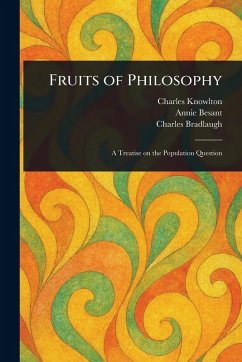"Fruits of Philosophy: A Treatise on the Population Question" by Charles Knowlton, a landmark work in the history of social science, tackles the complex and enduring issue of population control. This meticulously prepared edition makes accessible Knowlton's influential exploration of Malthusianism and its implications for family planning. Addressing vital concerns related to demography and public health, the treatise delves into the then-controversial topic of contraception and birth control. Knowlton's work offered practical advice and sparked considerable debate, making it a pivotal text in discussions surrounding family size and societal well-being. This edition preserves the original text, allowing readers to engage directly with Knowlton's arguments and understand the historical context of these important discussions. A crucial resource for anyone interested in the history of social thought and the evolution of ideas surrounding population management and family relationships. This work has been selected by scholars as being culturally important, and is part of the knowledge base of civilization as we know it. This work is in the public domain in the United States of America, and possibly other nations. Within the United States, you may freely copy and distribute this work, as no entity (individual or corporate) has a copyright on the body of the work. Scholars believe, and we concur, that this work is important enough to be preserved, reproduced, and made generally available to the public. We appreciate your support of the preservation process, and thank you for being an important part of keeping this knowledge alive and relevant.
Bitte wählen Sie Ihr Anliegen aus.
Rechnungen
Retourenschein anfordern
Bestellstatus
Storno









